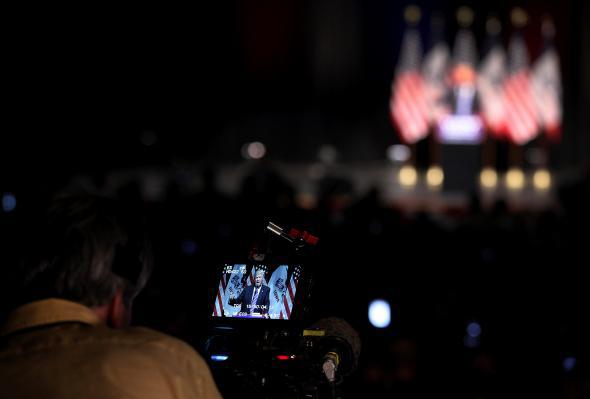Donald Trump has spent $0—as in zero—on paid television advertising during his general election campaign. That’s the latest finding from NBC News, which has teamed up with an analysis firm to track how much each White House hopeful is paying to get his or her message on the airwaves. Making Trump’s complete lack of spending even more remarkable is the fact that Hillary Clinton has already shelled out $61 million on television ads over the same time.
Trump’s message hasn’t been completely absent from the commercial breaks. Two outside groups backing his campaign—one is the National Rifle Association—have spent a combined $12.4 million to help his cause, according to the analysis, but even when you add that total to Trump’s own, that gets him to, well, $12.4 million. For comparison, pro-Clinton outside groups have spent $43 million on TV advertising, which brings Hillary’s total to $104 million, or more than eight times the amount Donald and his friends have spent on the medium. (Clinton still has some spending to do to match the $400-plus million Team Obama and Team Romney each spent on TV ads in the 2012 general election, though she and her allies are off to a solid start.)
There are still almost three months left for Trump to spread his message until election day, but not nearly as much time for his campaign to turn things around given early voting actually starts in some places next month. And what happens when those first ballots are cast can impact the ones that come later, as the New York Times noted Tuesday in an article about the importance of winning the early voting battle:
Early voting has become a critical, even decisive factor in presidential elections: President Obama was sufficiently ahead in the early vote in Iowa and Nevada in 2012 that his campaign shifted resources from those states to others, according to former advisers, who also credited enthusiastic early voting in 2008 for his victory in North Carolina and elsewhere.
Nearly 32 percent of voters cast their ballots before Election Day in 2012, according to census data, compared with 29.7 percent in 2008 and 20 percent in 2004.
Compounding the confusion over what Trump is waiting for, exactly, is his relatively flush campaign bank account. Trump and the Republican Party reported raising $82 million in July, and ending the month with $74 million on hand. If the GOP nominee wanted to be airing TV commercials right now, he could be airing TV commercials right now.
Like most things about Trump’s campaign, it’s hard to figure out what he’s trying to do here—or if he’s even trying to do anything anymore. There’s little reason for a candidate to finish the campaign with money in the bank. Under FEC rules, you can’t use the leftover cash for personal expenses, though it’s worth noting that you can donate it to a political party or charity of your choice. It’s easy to imagine Trump cutting a campaign check in December to the Donald J. Trump Foundation, which he has a history of using to play the role of benevolent billionaire without having to actually be one. Still, if that’s his ultimate end game here, he’s an even better con man than we’ve been giving him credit for.
For now, the issue isn’t what Trump will do down the road, but what he isn’t doing now. The celebrity businessman has dominated in the free media department since he stepped off the escalator at Trump Tower last summer and into the GOP race. And he often cites his social media accounts as proof that he doesn’t need traditional paid advertising the way other candidates do. But clearly his Twitter-fueled, all-press-is-good-press strategy is failing to pay the same dividends in general election polls as it did during primary season. In the GOP race, Trump succeeded by making the contest all about him. In the general election, he is failing in no small part because he refuses to allow the contest to be about anything but him. If Trump wanted to change that dynamic, running attack ads would be a natural place to start. Perhaps, then, it’s no surprise that he hasn’t.
